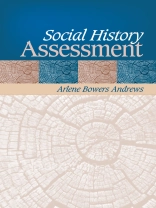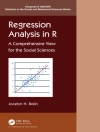‘Her book takes us on a journey back to the basics of conducting a thorough and informative social history and is an account of what a real social history involves…I recommend this book not only for the novice but also for all clinicians who want an edge on how to accumulate more pertinent information concerning their patients and to guide their treatment.’
—PSYCCRITIQUES
‘…what impresses me about this text is that Andrews uses her love of social history to take a subject that is rarely celebrated and remind us of what is exciting about it.’
—FAMILIES IN SOCIETY
Social History Assessment is the first resource to offer practical guidance about
interpreting the social history. Author Arlene Bowers Andrews provides rich resources to assist helping professionals as they gather and–most importantly–interpret information about social relationships in the lives of individuals.
Key Features:
- Focuses on interpreting and making meaning of the social history: Humans are complex creatures. Their biology, psychology, and social relations affect their thoughts, emotions, behaviors, and sensations. This book particularly addresses the personal social history, that is, the interpersonal relationships that have influenced the development of the person during the life course.
- Offers comprehensive guidance on composing a social history: In addition to numerous case examples and a variety of helpful tools such as genograms and ecomaps, the chapters cover ethical issues, core theories of human behavior in the social environment, tips for comprehensively gathering information about and describing the social history, and guidance regarding interpreting the history.
- Reaches a multidisciplinary audience: Whether the professional comes from social work, psychology, counseling, psychiatry, nursing, or another health or human service discipline, exploring the client’s origins helps build rapport and lays the foundation for mutual client-professional assessment. This book offers a common understanding across disciplines of what constitutes an informative social history, with theoretically grounded interpretation, to benefit multidisciplinary teamwork and the client.
Intended Audience:
This is an ideal supplemental text for a variety of advanced undergraduate and graduate courses in Social Work Practice, Direct Practice, Interviewing, Human Behavior in the Social Environment, Family Studies, Education (counseling), Psychology (counseling and clinical), and Nursing. It is also an excellent resource for Social Workers, Counselors, and Psychologists.
Cuprins
Preface
Ch 1. The Significance of a Person′s Social History
Ch 2. The Professional Lens, Part I
Human and Social Development and the Life Course
Ch 3. The Professional Lens, Part II
Social Ecology of Human Development and Behavior
Ch 4. Describing the Social History
Ch 5. Making Meaning: Interpreting the Social History
Ch 6. Tools to Aid Social History Development
References
Despre autor
Dr. Arlene Bowers Andrews, community psychologist and Professor of Social Work at the University of South Carolina, has extensive experience in community-based practice and research, program evaluation, and services systems for families affected by turbulence. At USC she was a founder and former director of the Institute for Families in Society, an interdisciplinary research center that conducts research to enhance families through community partnerships. Prior to her academic career, she was the founding executive director of Sistercare, a multi-county system of services to families affected by intimate partner violence, founding executive director of Prevent Child Abuse-South Carolina, and a board member of multiple community and regional organizations, including the Southern Regional Council. She served for eight years on the South Carolina Joint Legislative Committee on Children and families and is an active volunteer in faith-based youth development work. She has been an expert witness on matters of family history and human behavior in federal and several state courts. Dr. Andrews is co-editor of The UN Convention on the Rights of the Child: Implementing the Right to an Adequate Standard of Living (Praeger, 1999), co-author with Elizabeth Beck and Sarah Escholz of In the Shadow of Death: Families of Loved Ones Who Face the Death Penalty (Oxford University Press, 2006), and the author of Victimization and Survivor Services (Springer, 1992), Send Me! The Story of Salkehatchie Summer Service (Providence Publishing House, 2006), and several articles and book chapters regarding violence prevention and community systems development. Dr. Andrews is a graduate of Duke University and the University of South Carolina.












